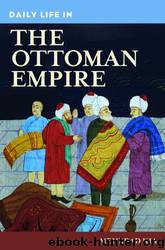Daily Life In The Ottoman Empire by Mehrdad Kia

Author:Mehrdad Kia [Kia, Mehrdad]
Language: eng
Format: epub
Published: 0101-01-01T00:00:00+00:00
Ramazan Bayrami
The end of Ramazan was marked with a three-day Islamic holiday called Ramazan Bayrami (Ramazan Festival) or Şeker Bayrami (Sugar Festival) also known in Arabic as Eid ul-Fitr or Eid us-Sagheer, Minor Festival. The month of fasting ended and the festivities began with the first appearance of the new moon heralding the month of Shawwal. At times, the bayram was delayed if the weather was cloudy and the new moon did not appear in the sky. If the sky remained cloudy and the moon was obscured, it was simply presumed that the new moon was present and the month of fasting had ended. In Istanbul, the end of Ramazan was officially proclaimed with discharging of cannons at the imperial palace. The lights and lamps on the minarets were extinguished, and drums and trumpets were played in public places and the homes of high government officials and court dignitaries.
Even before the arrival of the bayram, the sultan — as well as the rich and powerful who surrounded him — demonstrated their devotion, charity, and piety by distributing alms to the poor. Some families prepared a variety of dishes and sent them to their neighbors, as well as to the poor and the needy. In the courtyards of the main mosques, markets were set up to sell meat, fruits, vegetables, sweets, clothing, fabrics, candles, toys, and a host of other popular goods. On the first day of Shawwal, the tenth month in the Islamic calendar, came the Ramazan celebration.
At the palace, the entrance leading to the apartments of the chief eunuch, who commanded the royal pages, was adorned with rich carpets, cushions, and furniture. A few hours before daybreak, the grand vizier and other high officials and court dignitaries assembled at the palace, where shortly after sunrise the sultan mounted his horse and rode passed his officials to attend prayers at Aya Sofya. After performing his prayers, the sultan returned to the palace and entered the royal chamber, where he sat on the throne with the grand vizier standing on his right and the chief eunuch standing on his left. The sons of the Han of Crimea, who lived as hostages at the Ottoman court, were the first to wish the sultan a happy bayram as they kissed the hem of his sleeve. To show his respect for them, the sultan walked three paces to meet them. Once the Tatar princes had retired, the grand vizier followed by kneeling in front of the sultan, kissing the hem of the sleeve of his royal master, and wishing him, on behalf of the entire government, happy and healthy festivities. After the grand vizier, the şeyhülislam led a delegation of religious dignitaries such as the kadiaskers (the highest religious judges under şeyhülislam), and the prominent Muslim scholars and preachers. The şeyhülislam approached the sultan, bowed his head to the ground, and, holding his hand on his girdle, kissed the sultan on the left shoulder. To express his respect for the religious establishment, the sultan walked one step forward to meet the şeyhülislam.
Download
This site does not store any files on its server. We only index and link to content provided by other sites. Please contact the content providers to delete copyright contents if any and email us, we'll remove relevant links or contents immediately.
| Africa | Americas |
| Arctic & Antarctica | Asia |
| Australia & Oceania | Europe |
| Middle East | Russia |
| United States | World |
| Ancient Civilizations | Military |
| Historical Study & Educational Resources |
Empire of the Sikhs by Patwant Singh(22172)
The Wind in My Hair by Masih Alinejad(4424)
The Templars by Dan Jones(4188)
Rise and Kill First by Ronen Bergman(4012)
The Rape of Nanking by Iris Chang(3516)
12 Strong by Doug Stanton(3057)
Blood and Sand by Alex Von Tunzelmann(2608)
The History of Jihad: From Muhammad to ISIS by Spencer Robert(2207)
Babylon's Ark by Lawrence Anthony(2070)
No Room for Small Dreams by Shimon Peres(1991)
The Turkish Psychedelic Explosion by Daniel Spicer(1988)
Gideon's Spies: The Secret History of the Mossad by Gordon Thomas(1950)
Inside the Middle East by Avi Melamed(1939)
The First Muslim The Story of Muhammad by Lesley Hazleton(1881)
Arabs by Eugene Rogan(1835)
Bus on Jaffa Road by Mike Kelly(1784)
Come, Tell Me How You Live by Mallowan Agatha Christie(1768)
Kabul 1841-42: Battle Story by Edmund Yorke(1649)
Citizen Strangers by Robinson Shira N.;(1535)
